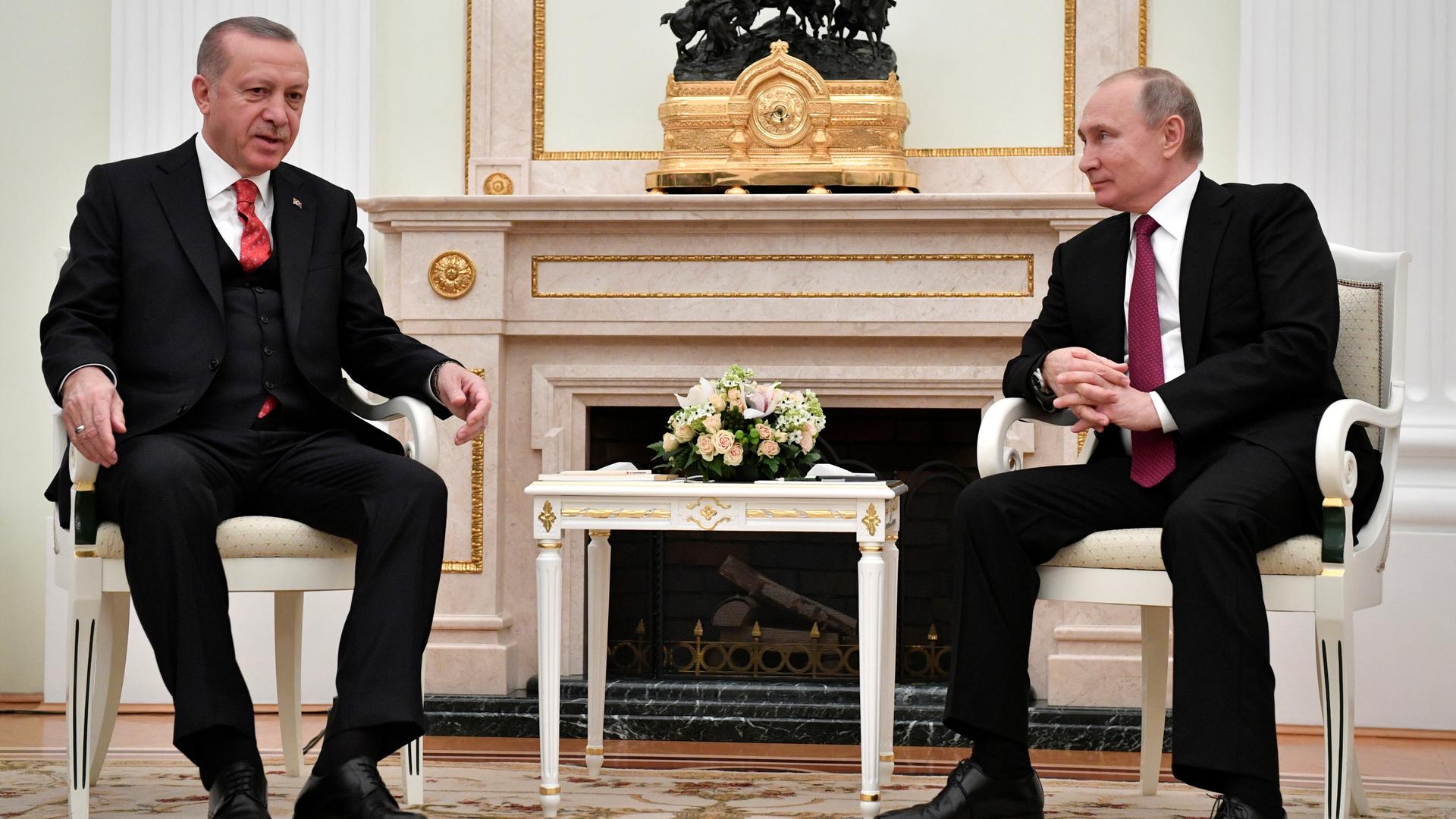Turkey’s President Recep Tayyip Erdogan arrived in Moscow on Wednesday to meet his Russian counterpart Vladimir Putin in the first face-to-face meeting of 2019 between both leaders.
The two leaders exchanged views on regional and international issues, particularly Syria, as well as bilateral relations between both countries.
“Dear Mr President, very glad to see you in Moscow. We continue our practice of regular meetings, consultations, exchange of views. I would like to note that this gives positive results,” Putin said while greeting Erdogan.
He noted that in 10 months of 2018, the Russian-Turkish trade turnover increased more than all of the previous year.
Putin said the growth in the number of Russian tourists – which increased by 30 percent last year, reaching a record figure of 6 million people – shows how the citizens of their countries “perceive the change in the nature and quality of Russian-Turkish relations.”
“Mr President dear friend, this is largely your merit and your personal achievement because you devote a lot of time to it,” the Russian president said.
Erdogan, for his part, stressed that developments on tourism help Turkish and Russian people socialise.
“Our commercial relations are also on the rise … we have set a big goal between us – to reach the $100 billion trade volume,” Erdogan said.
On bilateral projects, Putin said they “are being implemented, everything is going according to plan.”
“And of course, we are actively cooperating on regional security issues in Syria,” Putin said.
TRT World speaks with Moscow-based researcher Nina Belyakova for more details.
Astana peace talks
Both leaders called for the continuation of the Astana peace process.
“I believe meetings between guarantor countries of Astana peace talks raise interest and are beneficial to the process,” Erdogan told the Russian president.
During the meeting Putin also expressed his condolences to Erdogan over the death of four Turkish citizens who were killed in a twin vessel fire in the Kerch Strait on January 21.
Putin said the incident had happened in neutral waters as one of the vessels was transferring its cargo of liquified gas to the other.
“Our services reacted quickly – did everything to save the people. But it is still a great tragedy for the families, for the victims. Please accept our condolences,” he said.
Erdogan is accompanied by a delegation including Turkish Foreign Minister Mevlut Cavusoglu, Energy and Natural Resources Minister Fatih Donmez, National Defense Minister Hulusi Akar, and Agriculture and Forestry Minister Bekir Pakdemirli.
Turkish Intelligence Organization (MIT) President Hakan Fidan, Presidential Spokesman Ibrahim Kalin and Presidential Communications Director Fahrettin Altun are also part of the delegation.
Turkey-Russia cooperation
Prior to his visit, an article penned by Erdogan titled “Turkey-Russia cooperation critical for resolving the crisis in Syria” was published in Russian daily Kommersant last week.
“We will not seek advice on how to deal with a terrorist group from anyone whose activities have been directed against our citizens for more than 30 years or ask for permission to fight terrorism.”
“We reserve the right, when the appropriate conditions arise, to pursue terrorists who threaten our country from Syrian territory,” Erdogan said in the article.
TRT World’s Hasan Abdullah has more.
Contacts with Putin in 2018
Erdogan and Putin had seven one-on-one meetings in 2018 and 18 phone calls to discuss bilateral relations and regional developments, especially Syria.
The leaders first met in the Turkish capital Ankara, where they chaired the Turkey-Russia High-Level Cooperation Council meeting on April 3, a day before a trilateral summit on Syria between the leaders of Turkey, Russia and Iran.
During the trilateral summit on April 4, Erdogan, Putin and Iranian President Hassan Rouhani stressed their joint resolve to oppose separatism as well as the use of terrorism as an excuse for changing Syria.
Erdogan, Putin and Rouhani are again expected to meet in the upcoming months to discuss the situation in Syria.
S-400 missile deal
Turkey’s decision to make a $2.5-million purchase of two S-400 air defence systems with four batteries from Russia culminated in an agreement signed by both sides on December 29, 2017.
This led to strong opposition from the US, which stipulated that Turkey scrap the deal as a precondition to its own sale of Patriot defense systems to Ankara.
Turkey has vehemently rejected Washington’s calls, with Erdogan saying on April 3 that the purchase was a decision for Turkey to make.
The S-400 is Russia’s most advanced long-range anti-aircraft missile system and can carry three types of missiles capable of destroying targets including ballistic and cruise missiles.
The system can track and engage up to 300 targets at a time and has an altitude ceiling of 27 km.










Discussion about this post